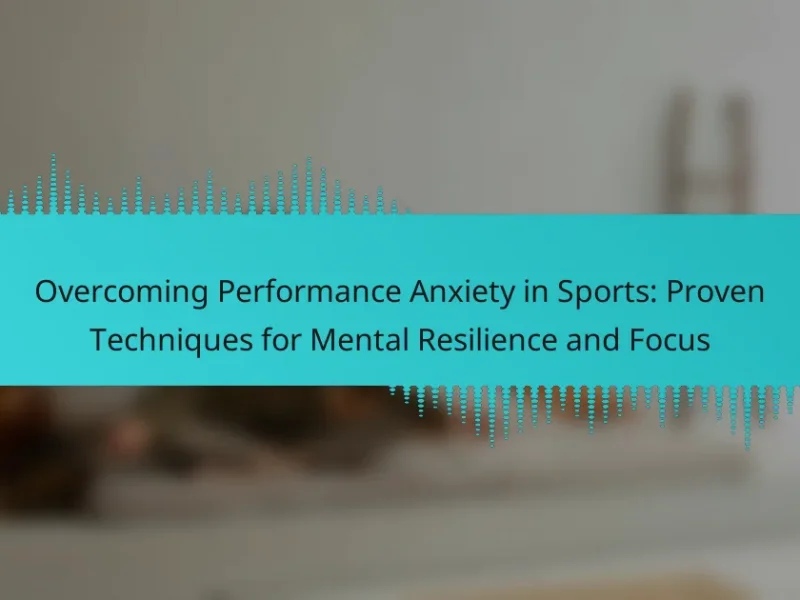Managing stress is crucial for athletes aiming to enhance performance and mental resilience. Techniques such as mindfulness, structured routines, and visualization can significantly reduce anxiety and improve focus. Engaging in social support systems fosters a positive environment, while regular physical activity boosts mood. Understanding and implementing these strategies can lead to better stress management and overall athletic success.

How Can Athletes Effectively Cope with Stress and Anxiety?
Athletes can effectively cope with stress and anxiety by implementing mental resilience techniques. Practicing mindfulness, engaging in deep-breathing exercises, and maintaining a structured routine can enhance focus and performance. Additionally, seeking social support from coaches and teammates fosters a positive environment. Incorporating visualization techniques allows athletes to mentally rehearse success, reducing anxiety levels. Regular physical activity also plays a crucial role, as it releases endorphins that improve mood. Ultimately, developing these coping strategies not only aids in managing stress but also enhances overall athletic performance.
What are the Common Sources of Stress for Athletes?
Common sources of stress for athletes include competition pressure, performance expectations, and injury concerns. These stressors can hinder mental resilience and affect performance.
Competition pressure arises from the desire to win and meet personal or team goals. Performance expectations can stem from coaches, teammates, and self-imposed standards. Injury concerns create anxiety about physical limitations and recovery.
Managing these stress sources is crucial for maintaining focus and enhancing performance. Techniques such as mindfulness, visualization, and structured training can help athletes cope effectively.
What Role Does Mental Resilience Play in Athletic Performance?
Mental resilience significantly enhances athletic performance by enabling athletes to cope with stress effectively. Techniques such as visualization, mindfulness, and positive self-talk improve focus and reduce anxiety. Research indicates that athletes with higher mental resilience experience less performance decline under pressure, allowing them to maintain peak performance. Developing mental resilience through structured training can lead to improved outcomes in competitive settings.

What Are Universal Techniques for Managing Stress?
Effective techniques for managing stress as an athlete include mindfulness, visualization, and structured breathing. These methods enhance mental resilience and performance. Mindfulness helps athletes stay present, reducing anxiety. Visualization allows them to mentally rehearse successful outcomes, boosting confidence. Structured breathing promotes relaxation and focus, improving overall performance. Regular practice of these techniques leads to better stress management and enhanced athletic capabilities.
How Can Breathing Exercises Help Reduce Anxiety?
Breathing exercises can significantly reduce anxiety by promoting relaxation and enhancing focus. These techniques help athletes manage stress, improve mental resilience, and enhance performance. Controlled breathing lowers heart rate, decreases muscle tension, and activates the parasympathetic nervous system. Research shows that deep breathing can lead to a 50% reduction in anxiety levels. Regular practice fosters a unique attribute of mental clarity, enabling athletes to maintain composure during high-pressure situations. Integrating breathing exercises into training routines can yield substantial benefits for overall mental health and performance.
What is the Impact of Physical Activity on Stress Levels?
Physical activity significantly reduces stress levels by promoting the release of endorphins, which enhance mood and relaxation. Engaging in regular exercise helps athletes develop mental resilience, improving their performance under pressure. Research indicates that even moderate physical activity can lead to a notable decrease in cortisol, the stress hormone. This physiological response contributes to better coping mechanisms, allowing athletes to manage stress effectively.
How Can Time Management Improve Performance and Reduce Anxiety?
Effective time management enhances performance and reduces anxiety by promoting focus and organization. Athletes who prioritize tasks can allocate time for training, recovery, and mental preparation. This structured approach minimizes last-minute stress and fosters a sense of control. Studies show that athletes who utilize time management techniques experience lower anxiety levels and improved performance metrics. For instance, breaking down training goals into manageable tasks helps maintain motivation and clarity. By establishing a routine, athletes can better cope with stress and enhance their overall mental resilience.

What Unique Strategies Can Athletes Use to Enhance Mental Resilience?
Athletes can enhance mental resilience through unique strategies like mindfulness, visualization, and cognitive reframing. Mindfulness techniques help athletes stay present, reducing anxiety and improving focus. Visualization allows them to mentally rehearse performance scenarios, boosting confidence. Cognitive reframing enables athletes to shift negative thoughts into positive ones, fostering a growth mindset. These strategies collectively enhance performance and stress management.
How Does Visualization Improve Performance Under Pressure?
Visualization significantly enhances performance under pressure by enabling athletes to mentally rehearse and prepare for high-stress situations. This technique fosters confidence and reduces anxiety by creating a clear mental image of success. Research indicates that visualization can lead to improved focus and better physiological responses during competition. By regularly practicing visualization, athletes develop mental resilience, allowing them to perform optimally even in challenging circumstances.
What Are the Benefits of Positive Self-Talk for Athletes?
Positive self-talk enhances athletes’ mental resilience, boosts confidence, and reduces stress. It encourages a positive mindset, which can lead to improved performance. Studies show that athletes using positive self-talk experience lower anxiety levels and greater focus during competition. Furthermore, this technique fosters a growth mindset, allowing athletes to learn from setbacks and maintain motivation.
How Can Goal Setting Mitigate Stress in Competitive Environments?
Goal setting can effectively mitigate stress in competitive environments by providing clear direction and focus. Setting specific, measurable, achievable, relevant, and time-bound (SMART) goals helps athletes concentrate on performance rather than stressors. This approach fosters mental resilience, allowing athletes to manage anxiety and maintain motivation. Research indicates that athletes who engage in goal setting report lower stress levels and improved performance outcomes. By breaking down larger objectives into smaller, manageable tasks, athletes can experience a sense of accomplishment, further reducing stress.

What Are Rare but Effective Techniques for Stress Management?
Mindfulness meditation is a rare but effective technique for stress management in athletes. It enhances mental resilience and performance by promoting focus and reducing anxiety. Research shows that just 10 minutes of daily practice can significantly lower stress levels. Visualization techniques are another unique strategy; athletes mentally rehearse their performance, which can improve confidence and reduce pre-competition nerves. Biofeedback, a less common method, allows athletes to gain awareness of physiological functions, enabling them to control stress responses. Finally, nature immersion, or spending time outdoors, has been shown to lower cortisol levels and improve overall mental well-being.
How Can Sports Psychology Consultations Aid in Coping with Stress?
Sports psychology consultations significantly aid athletes in coping with stress by providing tailored mental strategies. These consultations enhance mental resilience, enabling athletes to manage performance anxiety effectively. Techniques such as visualization and mindfulness are commonly employed, helping athletes focus on their goals and reduce negative thoughts. Research indicates that athletes who engage in sports psychology report improved emotional regulation and increased confidence, which are crucial for peak performance. Overall, these consultations serve as a vital resource for athletes seeking to enhance their mental fortitude and cope with competitive pressures.
What is the Role of Nutrition in Stress Management for Athletes?
Nutrition plays a crucial role in stress management for athletes by enhancing mental resilience and performance. Proper nutrition supports energy levels, optimizes recovery, and stabilizes mood. For example, complex carbohydrates can increase serotonin levels, promoting a sense of well-being. Additionally, omega-3 fatty acids found in fish can reduce anxiety and improve cognitive function. Hydration is another key factor; dehydration can lead to increased cortisol levels, exacerbating stress. A balanced diet rich in vitamins and minerals further supports overall mental health, allowing athletes to cope better with stress.
How Can Mindfulness Practices Enhance Athletic Performance?
Mindfulness practices significantly enhance athletic performance by improving focus and reducing stress. Techniques such as meditation and breathing exercises cultivate mental resilience, enabling athletes to manage pressure effectively. Research shows that athletes who engage in mindfulness report increased concentration and decreased anxiety, leading to better overall performance. Additionally, these practices can enhance recovery by promoting relaxation and mental clarity, essential for peak performance.

What Are the Common Mistakes Athletes Make When Coping with Stress?
Athletes often make several common mistakes when coping with stress, which can hinder their performance. One major error is neglecting mental health, focusing solely on physical training. Another mistake is failing to develop effective coping strategies, such as mindfulness or relaxation techniques. Athletes may also overlook the importance of seeking support from coaches or sports psychologists, leading to isolation. Lastly, many athletes underestimate the impact of stress on their performance, ignoring signs of burnout or anxiety. Recognizing and addressing these mistakes can enhance mental resilience and overall performance.
How Can Overtraining Lead to Increased Stress and Anxiety?
Overtraining can significantly increase stress and anxiety levels in athletes. The physical demands of excessive training deplete energy reserves, leading to fatigue and heightened emotional responses.
When athletes push beyond their limits without adequate recovery, they may experience hormonal imbalances, particularly elevated cortisol levels, which is linked to stress. This physiological response can manifest as anxiety, reducing overall performance and mental resilience.
Additionally, overtraining can disrupt sleep patterns, further exacerbating stress and anxiety. Quality sleep is crucial for recovery and mental clarity, and its disruption can create a cycle of stress that impacts both physical and mental health.
To mitigate these effects, athletes should incorporate rest days, balance training intensity, and utilize stress management techniques such as mindfulness and relaxation exercises. These strategies can help maintain mental resilience and enhance performance.
What Are the Risks of Ignoring Mental Health in Sports?
Ignoring mental health in sports can lead to severe consequences for athletes. Risks include decreased performance, increased stress, burnout, and potential mental health disorders. Athletes may experience anxiety and depression, impacting their training and competition. As a result, prioritizing mental resilience techniques can enhance performance and overall well-being.

What Best Practices Can Athletes Implement for Ongoing Stress Management?
Athletes can implement mindfulness, structured routines, and support systems for effective stress management. Mindfulness practices, such as meditation and breathing exercises, enhance focus and reduce anxiety. Establishing structured daily routines promotes stability and predictability, aiding mental resilience. Engaging with coaches, teammates, or mental health professionals fosters a supportive environment, crucial for emotional well-being. These practices collectively enhance performance and overall mental health.
How Can Regular Mental Health Check-Ins Improve Performance?
Regular mental health check-ins enhance athletic performance by fostering resilience and reducing stress. These sessions provide athletes with tools to manage anxiety, improve focus, and maintain motivation. Studies show that athletes who engage in regular mental health assessments report higher levels of performance and satisfaction. Additionally, consistent check-ins can identify early signs of burnout, allowing for timely intervention. This proactive approach supports mental well-being and ultimately leads to improved athletic outcomes.
What Techniques Can Athletes Use to Maintain Focus During High-Pressure Situations?
Athletes can maintain focus during high-pressure situations by employing techniques such as visualization, mindfulness, and controlled breathing. Visualization involves mentally rehearsing successful performances, which enhances confidence and reduces anxiety. Mindfulness practices help athletes stay present, minimizing distractions from external pressures. Controlled breathing techniques, like deep diaphragmatic breathing, can lower heart rate and promote calmness, enabling better concentration. These methods contribute to mental resilience and overall performance enhancement in competitive environments.
How Can Team Support Systems Aid in Stress Reduction?
Team support systems significantly aid in stress reduction for athletes by providing emotional and practical assistance. These systems foster a sense of belonging and shared purpose, which can alleviate feelings of isolation during high-pressure situations.
Support from teammates and coaches enhances resilience by promoting open communication about stressors. This environment allows athletes to share experiences and coping strategies, leading to improved mental health. Additionally, structured team activities can divert focus from stress and reinforce camaraderie, ultimately enhancing performance.
Research indicates that athletes who engage in supportive team dynamics report lower stress levels and higher satisfaction with their sports experience. Such dynamics create a unique attribute of collective resilience, where the group’s strength contributes to individual well-being.


